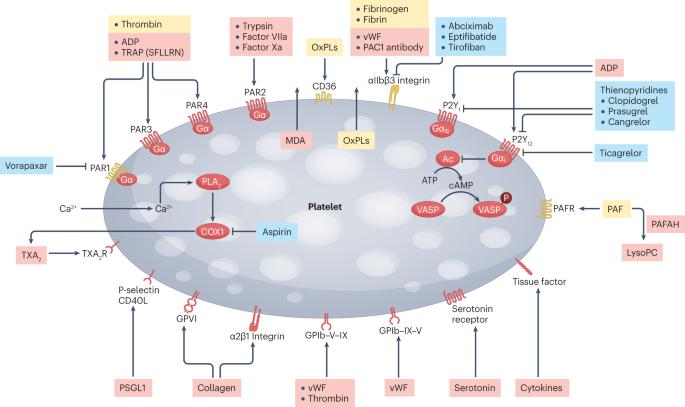脂蛋白(a)、血小板功能和心血管疾病。
IF 41.7
1区 医学
Q1 CARDIAC & CARDIOVASCULAR SYSTEMS
引用次数: 0
摘要
脂蛋白(a)(Lp(a))通过多种机制与动脉粥样硬化血栓形成有关,包括假定的抗纤溶特性。然而,遗传关联研究尚未证明血浆Lp(a)水平高与静脉血栓栓塞风险之间的关联,对Lp(b)水平高的患者的研究表明,降低Lp(c)不会改变离体血浆的凝血特性。Lp(a)可以与几种血小板受体相互作用,为促聚集作用提供生物学合理性。观察性临床研究表明,血浆Lp(a)浓度升高与血运重建患者的长期预后较差有关。此外,在这些患者中,血浆Lp(a)水平升高的患者比Lp(b)水平正常的患者从长期双抗血小板治疗中获益更多。在服用阿司匹林的健康老年人中进行的ASPREE试验显示,那些LPA单核苷酸多态性与血浆Lp(a)水平升高有关的人的缺血性事件减少,而出血事件没有增加。在这篇综述中,我们重新审视了Lp(a)在血小板功能调节中的作用,并提出了进一步定义观察到的Lp(a)和血小板功能之间的相关性与心血管疾病的临床相关性的研究领域。本文章由计算机程序翻译,如有差异,请以英文原文为准。

Lipoprotein(a), platelet function and cardiovascular disease
Lipoprotein(a) (Lp(a)) is associated with atherothrombosis through several mechanisms, including putative antifibrinolytic properties. However, genetic association studies have not demonstrated an association between high plasma levels of Lp(a) and the risk of venous thromboembolism, and studies in patients with highly elevated Lp(a) levels have shown that Lp(a) lowering does not modify the clotting properties of plasma ex vivo. Lp(a) can interact with several platelet receptors, providing biological plausibility for a pro-aggregatory effect. Observational clinical studies suggest that elevated plasma Lp(a) concentrations are associated with worse long-term outcomes in patients undergoing revascularization. Furthermore, in these patients, those with elevated plasma Lp(a) levels derive more benefit from prolonged dual antiplatelet therapy than those with normal Lp(a) levels. The ASPREE trial in healthy older individuals treated with aspirin showed a reduction in ischaemic events in those who had a single-nucleotide polymorphism in LPA that is associated with elevated Lp(a) levels in plasma, without an increase in bleeding events. In this Review, we re-examine the role of Lp(a) in the regulation of platelet function and suggest areas of research to define further the clinical relevance to cardiovascular disease of the observed associations between Lp(a) and platelet function. In this Review, Tsimikas and co-workers re-examine the role of lipoprotein(a) in the regulation of platelet function and propose areas for future research to define its clinical relevance for cardiovascular disease.
求助全文
通过发布文献求助,成功后即可免费获取论文全文。
去求助
来源期刊

Nature Reviews Cardiology
医学-心血管系统
CiteScore
53.10
自引率
0.60%
发文量
143
审稿时长
6-12 weeks
期刊介绍:
Nature Reviews Cardiology aims to be the go-to source for reviews and commentaries in the scientific and clinical communities it serves. Focused on providing authoritative and accessible articles enriched with clear figures and tables, the journal strives to offer unparalleled service to authors, referees, and readers, maximizing the usefulness and impact of each publication. It covers a broad range of content types, including Research Highlights, Comments, News & Views, Reviews, Consensus Statements, and Perspectives, catering to practising cardiologists and cardiovascular research scientists. Authored by renowned clinicians, academics, and researchers, the content targets readers in the biological and medical sciences, ensuring accessibility across various disciplines. In-depth Reviews offer up-to-date information, while Consensus Statements provide evidence-based recommendations. Perspectives and News & Views present topical discussions and opinions, and the Research Highlights section filters primary research from cardiovascular and general medical journals. As part of the Nature Reviews portfolio, Nature Reviews Cardiology maintains high standards and a wide reach.
 求助内容:
求助内容: 应助结果提醒方式:
应助结果提醒方式:


